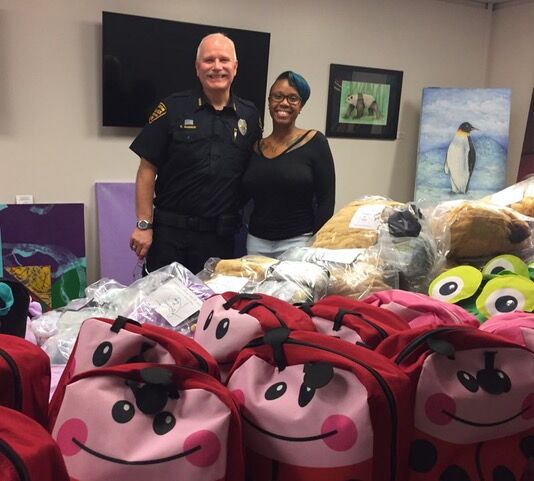In 2014, Jerrad Trotter started a nonprofit based on the premise that she has never met a stranger.
“The idea behind Strangers We Know is that we are all connected. We know each other on some level through our individual experiences. We have all cried, laughed, loved and been hurt, and we want to build on those shared experiences,” said Trotter, who at the time was a case aid for Arizona Child Protective Services and recognized a gap in resources for young people as they aged out of the system.
The organization seeks to build on human connections and fill that gap, which Trotter has seen contribute to homelessness, poverty, incarceration, teen pregnancies and other social issues.
“Kids are legally adults at 18, but to me, they are still babies. Many of them can get jaded and don’t want to be involved in the state system anymore, but the caveat is that if there is help for them, they have to remain part of the system to have some resources available,” said Trotter.
As an antidote, Strangers We Know offers a variety of programs including BRIDGES (Building Resourceful Individuals Destined for Greatness by Establishing Support), which provides support for young adults as they transition out of the foster care system. BRIDGES offers real-time assistance in the form of Home Starter Kits filled with towels, sheets, blankets, shower curtains, pots, pans and other household items.
Trotter said Strangers We Know works to distribute the kits through partnerships with the state and Arizona’s Children Association, with a goal of reaching 10% to 20% of the young adults who have aged out of the system each year.
“We ship kits and make deliveries, and the kids can do pickups. We also provide cash scholarships and gift cards so kids can buy food and items for their homes at Target and Walmart,” said Trotter.
The nonprofit also spearheaded the Capes 4 Kiddos program, which provides toiletries and other essential items in reusable backpacks and bags that convert to capes, pillows or blankets for children who are removed from their homes or separated from their families. The bags are distributed through the Tucson Police Department.

Volunteers with Strangers We Know participate in Value Exchange, the idea that value is placed on individuals, not circumstances, and everyone can be of service to others in the community.
In additional outreach, Strangers We Know targets Tucson’s homeless population through HomeFree, a program that provides care packages containing toiletries, sunblock, hats, water and other essentials.
Trotter said the kits are distinguished by positive messages that are personally delivered to the recipients.
“We go out to the homeless camps and sit and talk with people and find out what their needs are. There is a percent of the population living on the streets who don’t want to transition from homelessness right now, so we make sure they know where to get help with mental health, haircuts, dental assistance and other needs in terms of food and money,” said Trotter.
She emphasized that person-to-person contact is key in determining how to direct the homeless and near-homeless toward resources.
“When you actually talk to people living on the streets, they have so many diverse stories. Sometimes we lump them all together and think that if they don’t have a home, they must want one. Many people are comfortable on the streets, while the temporarily homeless may not have access to things they need because they have not adapted to that lifestyle and don’t know how to find resources. Our hope is to bring access to resources to single parents and those in temporary homeless circumstances,” said Trotter.
Ultimately, outreach is the cornerstone of the organization’s general philosophy, which embraces “Value Exchange:” The idea that value is placed on individuals, not circumstances. Trotter emphasized that everyone has the ability to give back to the community.
“We invite the community to come out and make things for our programs. They can get things they need while they make things to give to others. If you need a food box or gift certificate, you can come help make blankets for children: The value exchange is your time. We remind everyone that we all have gifts to share,” said Trotter.
Although value exchange and outreach was limited by protocols during the pandemic, Trotter is looking forward to starting up again since the mask mandate has ended. She is collecting unused or gently used fabric masks and t-shirts with plans to up-cycle the items for future projects.
“Cloth is important, and we use up-cycling as a way to minimize waste. Lots of people were making and selling masks and instead of throwing these masks out or putting them on a shelf, people can send them to us and we will figure out a way to use them. They have already served in one capacity and we are hoping they will serve again in another capacity,” Trotter said.





